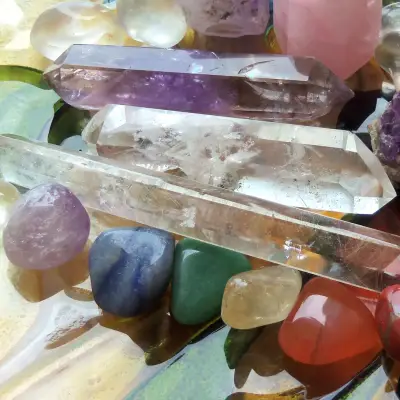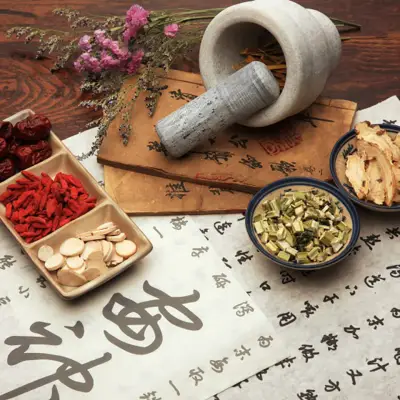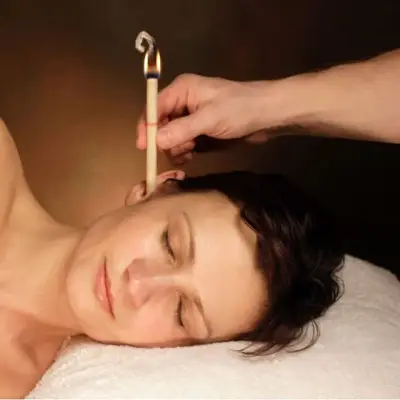Are you curious about cacao ceremonies? Maybe you've heard whispers of these ancient rituals and wondered what they involve, or perhaps you're exploring ways to deepen your spiritual practice. In this post, we'll unpick cacao ceremonies, explaining what they are, their benefits, and how you can participate in or even facilitate one.
Jump To:
- What is Cacao?
- What is a Cacao Ceremony?
- The Origins of Cacao Ceremonies
- Benefits of Ceremonial Cacao
- Preparing for a Cacao Ceremony
- Participating in a Cacao Ceremony
- The Spiritual Aspect of Cacao Ceremonies
- Frequently Asked Questions About Cacao Ceremonies
- Become Qualified for Cacao Ceremony Hosting for £29
What is Cacao?
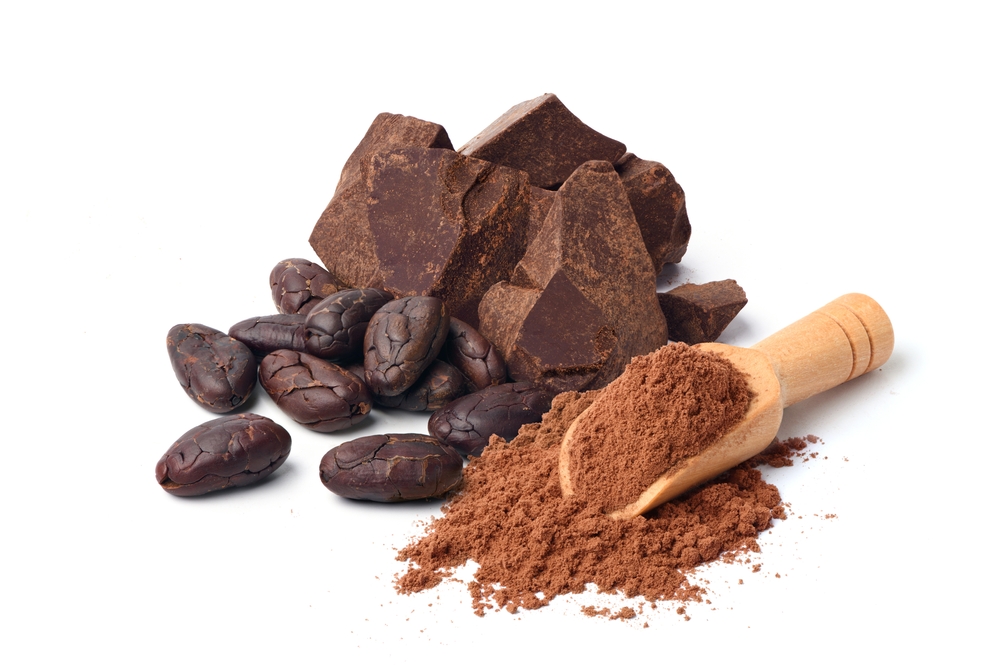
Cacao is the raw, unprocessed form of chocolate. Unlike the chocolate bars you find in shops, ceremonial cacao is minimally processed and retains all its natural nutrients. It comes from the seeds of the cacao tree, which are fermented, dried, and then ground into a paste to create a cacao block. This paste is the heart of what we call ceremonial cacao.
What is a Cacao Ceremony?
A cacao ceremony is a ritual that uses ceremonial cacao to unlock heart-opening and spiritual experiences. These ceremonies have been practised for thousands of years, particularly by indigenous peoples in Central and South America. They are typically conducted in a group setting, where participants drink a cacao beverage and engage in activities such as meditation, intention setting, and sharing circles.
Recommended for you!
Best SellersThe Origins of Cacao Ceremonies
Benefits of Ceremonial Cacao
Ceremonial cacao offers many benefits that span the spiritual, physical, and mental realms. By incorporating this powerful plant into your wellness practices, you can experience powerful transformations in various aspects of your life.
Spiritual and Emotional Benefits
Ceremonial cacao is known for its heart-opening properties. Many participants report feeling a deeper connection to themselves and others, as well as heightened intuition and emotional clarity. It's also believed to help release negative emotions and promote a sense of inner peace and happiness.
The ritualistic aspect of cacao ceremonies can foster a sense of community and belonging, which is especially beneficial for those seeking connection in their lives.
Physical Benefits
Cacao is packed with antioxidants, magnesium, and other nutrients that are beneficial for the body. It can enhance blood flow, improve cardiovascular health, and provide a gentle energy boost without the jitters often associated with caffeine. Additionally, the anti-inflammatory properties of cacao can support overall health and wellness, making it a valuable addition to a balanced diet.
Mental and Psychological Benefits
Cacao contains theobromine, a natural stimulant that can enhance mood and cognitive function. Many people find that it helps with focus and creativity, making it a popular choice for those seeking mental clarity and inspiration. The serotonin-boosting properties of cacao can also help reduce symptoms of depression and anxiety, offering a natural way to support mental health.
Enhanced Mindfulness and Meditation
One key benefit of ceremonial cacao is its ability to deepen mindfulness and meditation practices. The gentle stimulation from cacao helps quiet the mind and fosters a state of relaxed awareness, making it easier to stay present during meditation. This can lead to more profound meditative experiences and a stronger connection to your inner self.
Emotional Release
Cacao's heart-opening properties can facilitate emotional release, helping you process and let go of past traumas or negative emotions. The supportive environment of a cacao ceremony provides a safe space for participants to explore and heal their emotional wounds, leading to greater emotional freedom and well-being.
Personal Growth
Engaging in regular cacao ceremonies can support personal growth and self-discovery. The introspective nature of these rituals encourages participants to reflect on their life choices, set meaningful intentions, and align more closely with their true purpose. This can lead to significant positive changes in life, fostering a greater sense of fulfilment and direction.
Preparing for a Cacao Ceremony
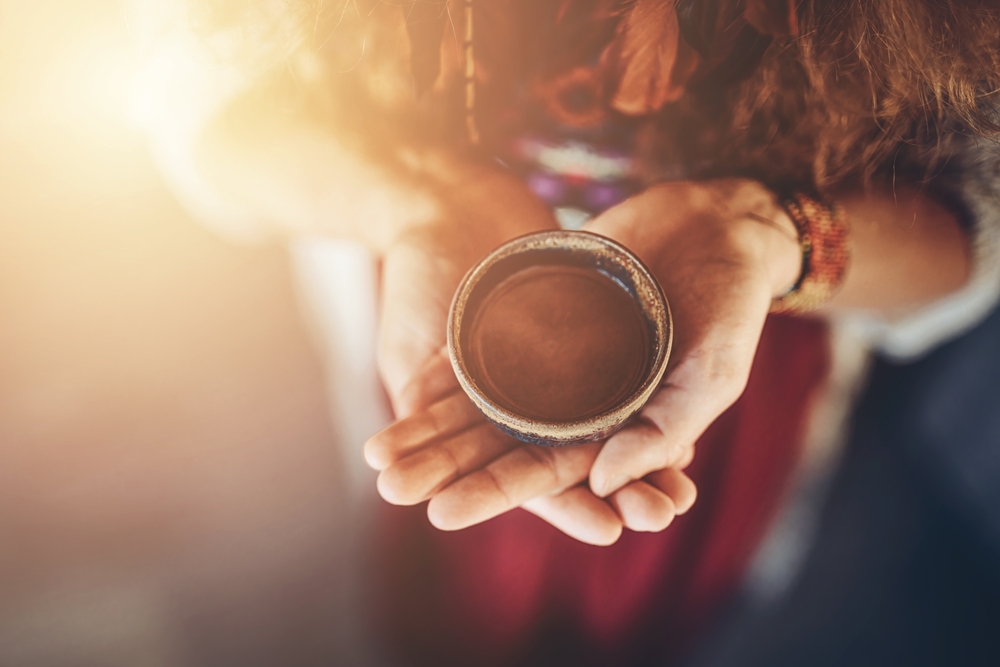
To participate in or host a cacao ceremony, you'll need ceremonial-grade cacao. This can be purchased online or from speciality shops. It's important to use high-quality cacao to ensure you experience its full benefits.
Cacao Ceremony Recipe
Here's a simple recipe to prepare ceremonial cacao:
1. Ingredients:
- 1-2 ounces of ceremonial cacao
- 1 cup of hot water or plant-based milk
- Optional: sweeteners like honey or agave, spices like cinnamon or cayenne pepper
2. Instructions:
- Heat the water or milk until it's warm but not boiling.
- Add the cacao and stir until it's fully dissolved.
- Sweeten and spice to taste.
Setting the Space
Create a comfortable, quiet space for your ceremony. You might want to include candles, incense, or calming music to enhance the atmosphere. Ensure you won't be disturbed, allowing you to fully immerse yourself in the experience.
Participating in a Cacao Ceremony
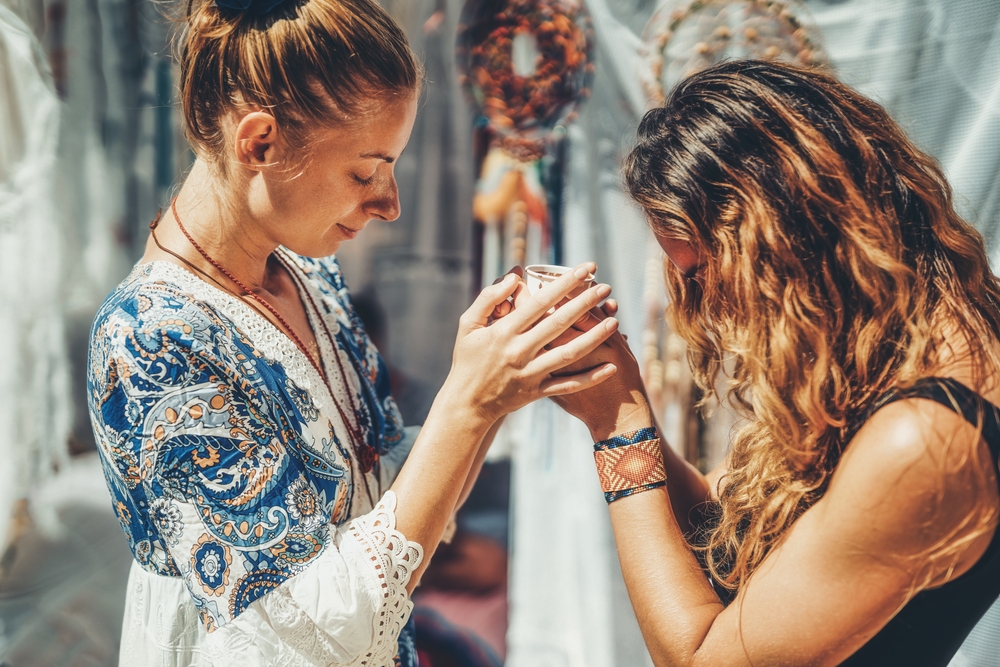
What to Expect
During a cacao ceremony, you will typically begin with a meditation or grounding exercise. This helps to centre your mind and body, preparing you for the experience ahead. After drinking the cacao, you might engage in activities such as guided meditation, intention setting, or sharing your thoughts and feelings with the group.
How Does Cacao Make You Feel?
Many people report feeling a gentle, uplifting energy after consuming ceremonial cacao. It's not as intense as a caffeine buzz, but rather a sustained, heart-centered feeling of warmth and connection. Some describe it as a feeling of being "in flow" or deeply in tune with themselves and their surroundings.
How to End a Cacao Ceremony
Closing a cacao ceremony is just as important as the beginning. This might involve a final meditation, sharing reflections with the group, or expressing gratitude for the experience. Taking time to ground yourself and integrate the experience can help you carry the benefits into your daily life.
What to Do After a Cacao Ceremony
After a cacao ceremony, it's beneficial to rest and reflect on your experience. Journaling can be a helpful way to process your thoughts and feelings. You might also choose to spend time in nature, engage in creative activities, or simply relax and enjoy the peaceful state induced by the cacao.
Potential Side Effects
While cacao is generally safe for most people, it's important to be aware of potential side effects. Some people might experience mild digestive discomfort or a slight increase in heart rate. It's also advisable for pregnant women and those with certain medical conditions to consult with a healthcare professional before participating in a cacao ceremony.
Who Should Not Do a Cacao Ceremony?
Cacao users with heart conditions, on certain medications, or who are sensitive to stimulants should exercise caution. If you're unsure whether cacao is safe for you, consult with a healthcare provider.
The Spiritual Aspect of Cacao Ceremonies
Does Cacao Open the Heart Chakra?
In many spiritual traditions, cacao is believed to open the heart chakra, promoting love, compassion, and emotional healing. This heart-opening effect is one of the main reasons people are drawn to cacao ceremonies, seeking deeper connections and emotional release.
Cacao and Meditation
Cacao is often used in conjunction with meditation to enhance the experience. Its gentle stimulant effects can help you stay focused and present, making it easier to enter a meditative state. Whether you're a seasoned meditator or new to the practice, adding cacao can deepen your experience.
Cacao and Intention Setting
Setting an intention is a key part of many cacao ceremonies. This might involve reflecting on what you want to release, invite in, or manifest in your life. By combining this intention with the heart-opening effects of cacao, you can amplify your focus and commitment to these goals.
Is Cacao Masculine or Feminine?
In many traditions, cacao is considered to have a feminine energy, associated with nurturing, intuition, and emotional healing. This doesn't mean it's only for women; people of all genders can benefit from its balancing and heart-opening properties.
Frequently Asked Questions About Cacao Ceremonies
Can You Drive After a Cacao Ceremony?
You can generally drive after a cacao ceremony. The effects of cacao are mild and not intoxicating, but it's always good to ensure you feel fully alert before getting behind the wheel.
How Long Does It Take for Cacao to Kick In?
The effects of cacao typically begin to be felt within 20 to 40 minutes after consumption. This can vary depending on factors such as your metabolism and whether you've eaten beforehand.
Is Cacao an Antidepressant?
While cacao is not a replacement for medical treatment, it contains compounds like theobromine and anandamide that can boost mood and promote feelings of happiness. Some people find it helpful as a natural supplement to support emotional well-being.
Is Cacao Good for Anxiety?
Cacao can have calming effects due to its magnesium content and ability to promote the release of feel-good chemicals in the brain. However, its effects can vary from person to person, and those with severe anxiety should consult with a healthcare professional.
Does Cacao Raise Dopamine?
Cacao can stimulate the release of dopamine, a neurotransmitter associated with pleasure and reward. This can contribute to the mood-enhancing effects that many people experience during a cacao ceremony.
Is Ceremonial Cacao Legal?
Ceremonial cacao is legal in the UK and many other countries. It's a natural, unprocessed product that can be enjoyed safely when used responsibly.
How Much Ceremonial Cacao Per Day?
It's generally recommended to start with 1 to 2 ounces of ceremonial cacao per day. This can be adjusted based on your individual response and needs.
Can You Drink Ceremonial Cacao Every Day?
While it's possible to drink ceremonial cacao daily, it's important to listen to your body and avoid overconsumption. Like any supplement, it should be enjoyed in moderation as part of a balanced lifestyle.
Should You Do a Cacao Ceremony on an Empty Stomach?
It's often recommended to consume cacao on a relatively empty stomach to enhance its absorption and effects. However, if you have a sensitive stomach, a light snack beforehand can help prevent any discomfort.
Is Ceremonial Cacao Healthy?
Ceremonial cacao is rich in antioxidants, minerals, and mood-enhancing compounds. When consumed in moderation, it can be a beneficial addition to a healthy lifestyle.
Recommended for you!
Best SellersBecome Qualified for Cacao Ceremony Hosting for £29
Cacao ceremonies offer a unique and enriching way to connect with yourself and others on a deeper level. If you're interested in discovering more about cacao ceremonies and perhaps even leading your own, consider enrolling in the Cacao Ceremony Facilitator Diploma Course with Centre of Excellence. This fascinating course will equip you with the knowledge and skills to facilitate your own cacao ceremonies, all at a discounted price of £29.

